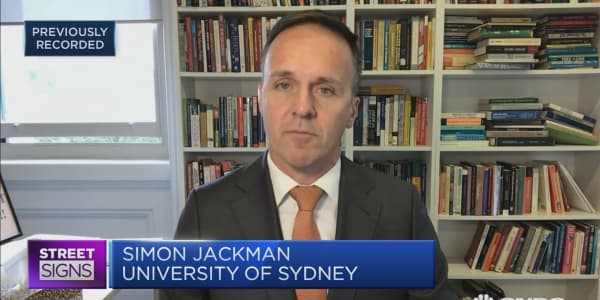China's currency is weakening — and it will likely weaken more — but foreign exchange strategists don't expect President-elect Donald Trump to be as tough on China and the yuan as he says he'll be.
"Right now, I'd say it's just rhetoric," said Marc Chandler, global head of currency strategy at Brown Brothers Harriman. Trump has accused China of manipulating its currency in order to make its exports unfairly competitive, and he has threatened a 45-percent tariff on Chinese imports. But Chandler pointed out how President Barack Obama, during his own presidential campaign, said China manipulated its currency but later softened his stance. And that's only one example of a U.S. politician talking tough about China until they get into office.
Overnight, the 's mid-point fix hit 6.8495, its lowest against the U.S. dollar since December 2008. Analysts largely see the yuan as weakening as the U.S. dollar strengthens on the back of rising interest rates.
Some analysts also attributed recent yuan weakness to concerns about Trump's calls for a tariff and his threats to label China a currency manipulator.
Dollar vs. yuan since 2007 (inverted chart)
But while the U.S. dollar index climbed above 100 this week to its highest since Dec. 3, 2015, currency strategists also noted relatively steady trade in the yuan versus a broader basket of currencies Chinese authorities introduced last December.
Still, the expected trajectory for the Chinese yuan remains lower versus the dollar.
Andres Jaime, global FX and rates strategist at Barclays, expects the Chinese yuan to hit 7.15 against the U.S. dollar by the third quarter of next year. "We continue to see this asymmetric reaction. Each time the dollar goes up versus everything, the yuan moves pretty much in line with" emerging-market currencies, Jaime said. "When the dollar sells off … the yuan stays flat."

Obama's comments in 2008 followed the Bush administration's refusal to formally declare China a currency manipulator. At that time, China was widely seen as intentionally keeping its currency weak so that its exports into the United States would be cheaper and able to out-compete U.S.-manufactured goods. But that dynamic has changed.
"In the mid-2000s, it was undervalued. That's no longer the case now," said Todd Lee, senior director at IHS Global Insight, citing a smaller trade surplus and more flexible exchange rate.
China ended a fixed peg for the yuan against the dollar in 2005, and has gradually widened the daily trading range to 2 percent. In another move toward, making the currency more market-oriented, the People's Bank of China announced in August 2015 it was fixing the midpoint based on the prior day's closing price.
"It's been weakening pretty steadily. I think the weakness continues until we see China have a rebound in growth, and I think the rebound in growth will come out of the export market," said Jason Leinwand, founder and CEO of currencies advisor FirstLine FX. He added that he doubts whether Trump's plans for tariffs would materialize.
"I don't think his case holds water in terms of him labeling the country as a currency manipulator," Leinwand said. "They're doing everything they can to open up their market to make it more global."
Consequences of 'a true float'
China and five other countries are on the U.S. Treasury's "monitoring list" for meeting at least one of three criteria for further scrutiny, according to an October report. But no country's economy satisfied those qualifications, including large trade surpluses with the U.S. and "persistent, one‐sided intervention."
"This isn't the right time to signal that China's long-standing exchange rate management has crossed over the line and become manipulation," Brad Setser, senior fellow and acting director of the Maurice R. Greenberg Center for Geoeconomic Studies at the Council on Foreign Relations, said in a blog post Tuesday morning.
"If China responded by ending all exchange rate management — no daily fix, no band, no intervention, a true float — the renminbi would certainly fall," he said, "and potentially fall by a lot."
Correction: This story has been updated to reflect that China only met one of the U.S. Treasury's criteria for being labeled a currency manipulator in October.





